CINCINNATI — She calls it a dance.
Flying 40 feet off the ground, Caroline Winstel scales the walls of Climb Time Oakley with apparent ease. Each foot gracefully finding its way higher and higher as each hand reaches toward the top.
Then with her work complete, Winstel floats back down, stretching her legs out on the floor and reaching for her water, her wheelchair waits just feet away.
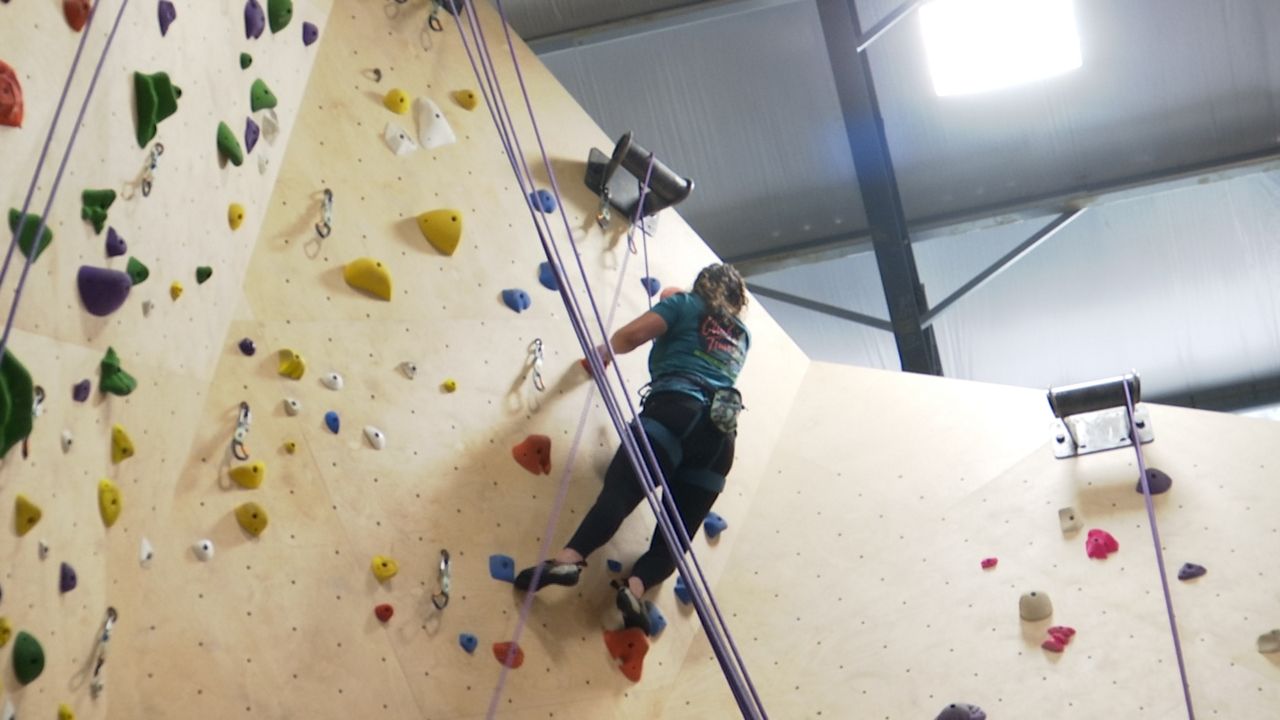
Winstel is what’s called an adaptive climber, a new title for a relatively new sport. First attracting attention in the 80s, adaptive climbing became a part of USA Climbing competitions in 2008.
Winstel said she only really began to understand what the sport entailed last summer when she entered the gym at Climb Time Oakley for the first time.
“I came in for part of my dissertation research on adaptive athletics,” she said. “It was something I always wanted to try so I was like, I’ll give it a try thinking it would be a one-off sort of thing.”
By the end of the day, Winstel bought a membership at Climb Time and approached coach Brent Flenner about training.
“It forced me to meet my body where it was,” Winstel said. “Just constant ebbs and flows and looking for spots and strengths and weaknesses.”
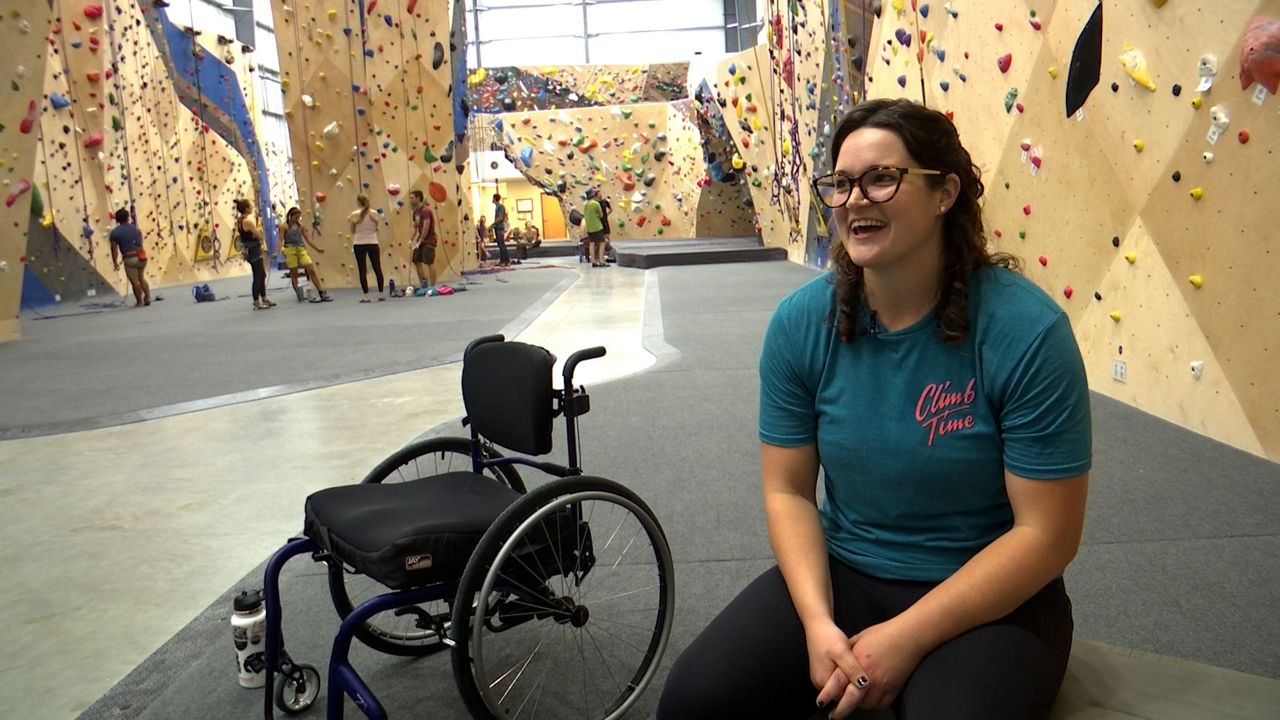
Winstel grew up an athlete. It was the way she saw herself and dominated her high school experience.
“My whole identity was based around volleyball,” she said. “Around being the best and being the strongest.”
She said she pushed herself to become an All-State athlete in Tennessee and earned a college scholarship to Tusculum University.
“I lived for it,” she said. “It was who I was.”
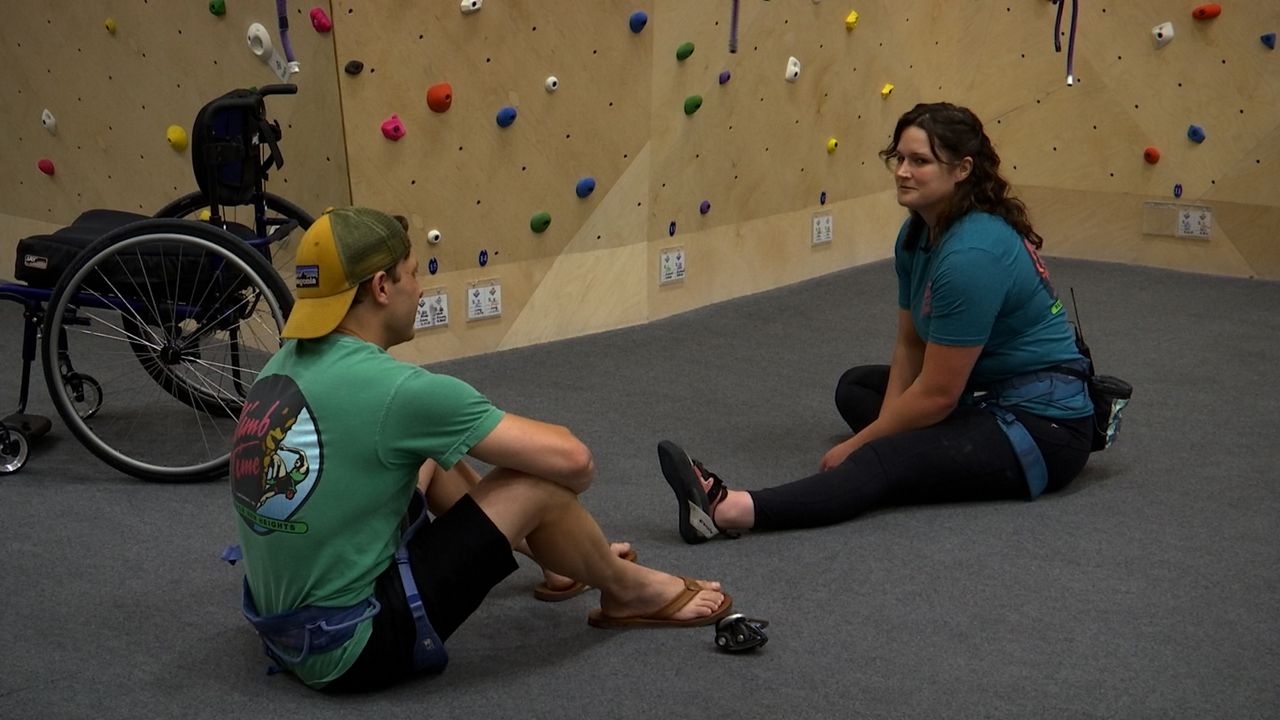
Now, Winstel said she can recognize the early signs of muscle breakdown were there, but as a teenager, she did her best not to notice.
“I always thought if I worked harder, trained better, my legs wouldn’t be as tired,” she said.
Then came the first day of preseason.
“We were on our second workout of the day,” she said. “And I hit my second lap and I thought, ‘Something’s not right.’”
Winstel ran out of the gym, hoping for a quick recovery. Then came back minutes later to try and complete the rest of the drills.
“Next thing I know, I drop,” she said. “I wake up on the training table, bags of ice are all over my body. I can’t really focus my eyes everyone’s talking around me.”
At first, Winstel thought it was heat exhaustion or dehydration, but when she went to the hospital, she learned there was a lot more going on with her body than she realized.
“Next thing I know, my mom’s coming in from Knoxville hauling it,” she said. “A doctor comes in with a printout from WebMD and it says, ‘rhabdomyolysis.’”
Rhabdomyolysis is a rare but serious syndrome in which muscles die, break down and enter the bloodstream.
“My levels were so high they said my heart and kidneys should have shut down,” Winstel said.
She said she stayed in the hospital for about a week then when she was released, everyone expected her to recover, but it wasn’t happening.
“I took about a month slow and I knew something was wrong,” she said. “I was spending all my hours like doing school work and in the weight room trying to get back and I never could.”
Winstel left Tusculum that winter, believing her athletic career was over.
“I spent just 18 to 25 trying to figure out what was going on. Nobody had any idea,” she said. “The diagnostic cycle was very long and very lonely.”
Eventually, she said doctors at the University of Cincinnati Medical Center uncovered she had a muscle disease along with connective tissue disorders and an autoimmune condition, though she said there’s still not a diagnosis that encapsulates everything going on with her body.
“They know it’s mitochondrial. They know it’s causing deficiencies but we still don’t really know,” she said.
What Winstel does know is that she’s easily exhausted. She can’t stand up and walk unassisted for more than about 10 minutes and her muscles cramp up frequently.
“It’s isolating experience to go through all of that when all you want to do is leave the doctor’s office and go for a run,” she said. “I would have given a million dollars just to like drop it all and run.”
Winstel never did end up running again, but her first day at Climb Time, she said she started to get a better understanding of what her body could do.
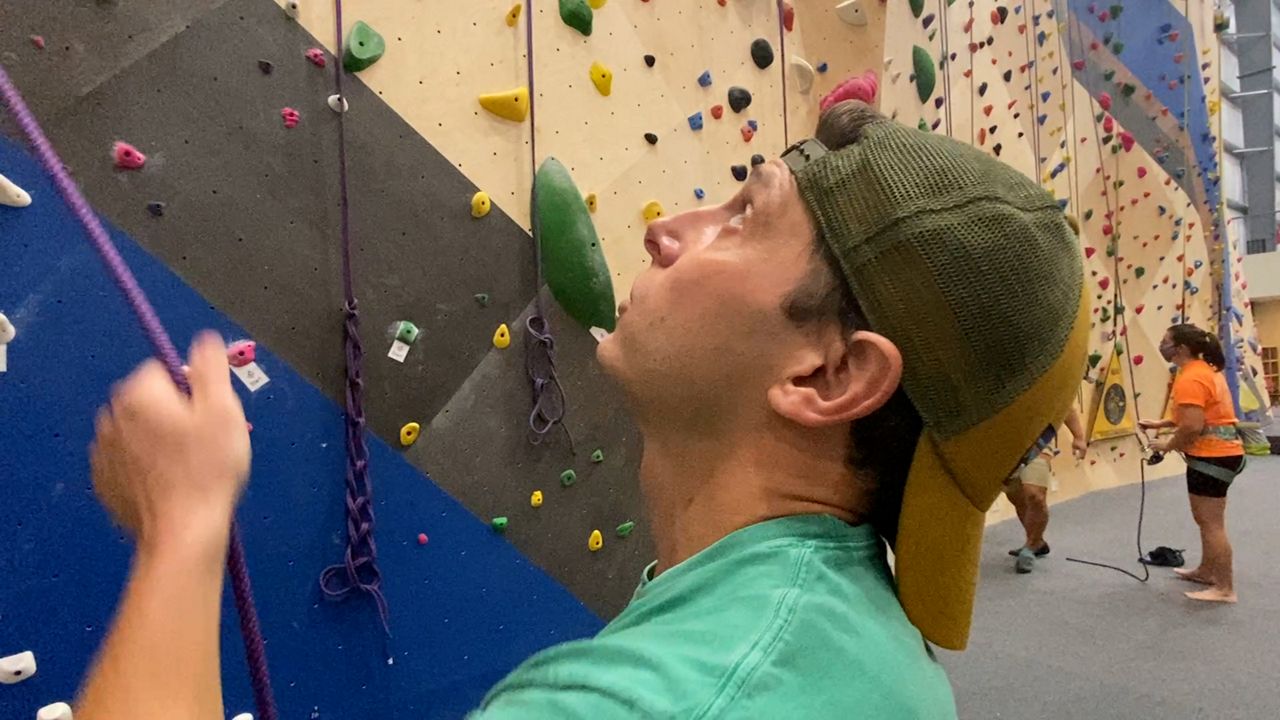
Climbing is a mental as well as a physical sport. Winstel said the short bursts of energy required to pull herself up are doable with her condition, but she said it’s the planning and puzzle solving that made her fall in love with the sport.
“The reason I loved volleyball is that it’s like a mix between chess and poetry, when it’s played right, it’s this dance,” she said. “And climbing to me was a lot of the same.”
Looking at Winstel scale the wall, it’s difficult to see her adaptations, but if you look closely, you’ll spot her pausing for a quick rest along the wall while she looks up planning her routes.
According to her coach, Flenner, they train to conserve her energy and understand where and how her muscles may tire. He said he’s never trained with an adaptive climber before, so he’s been learning alongside her.
“She had to give me literature,” Flenner said. “I had to do some research on my own because some of the general techniques and skills that I try to teach climbers are not necessarily applicable to Caroline at all times.”
Still, Winstel picked up the sport quickly, and a few months in, she felt something she’d been missing for more than 10 years: The urge to compete.
“I thought I didn’t need to be an athlete anymore and that was the biggest lie I ever told myself,” she said.
Winstel learned the Paraclimbing National Championships would take place June of 2021, showed Flenner and the two began preparing.
“I don’t do anything halfway,” Winstel said.
Less than a year after starting the sport, she and Flenner arrived in Salt Lake City to compete against some of the best adaptive climbers in the country and Winstel said she felt at home.
“Where I’m hyperaware in spaces like this about how my body moves and how I’m different, there it was nothing,” she said.
Her first day of competition got off to a strong start. Winstel said she sailed through the qualifying round ending the day in third place in her division.
Then the next day, preparing for the finals, she said the nerves hit. Winstel knew if she finished in third, she’d qualify for the Paraclimbing World Cup.
“I’ve played in a lot of high-stakes games,” she said. “I’ve been in those high-pressure situations, I’m very comfy in those. This was a pressure unlike anything I’ve ever known.”
That morning she composed herself, talked to Flenner and started to climb, once again starting off strong.
“To climb with confidence and security with hundreds of people and the TVs on you is so difficult to do,” Flenner said. “It takes a lot of training and a lot of skill and Caroline encompasses both of those.”
Then about three-quarters up the wall, Winstel started to lose steam. She said she was tired, she didn’t rest when she needed to and then she hit a difficult hold. Winstel lost control and fell.
“I came down and I’ve lost things before,” she said. “But I was grinning ear to ear.”
Ultimately, Winstel scored half a point short of qualifying for the World Cup, but she knew almost immediately, she’d be back next year.
“It wasn’t about trophies, it wasn’t about being the best but just loving climbing is something I will be forever grateful for,” she said.
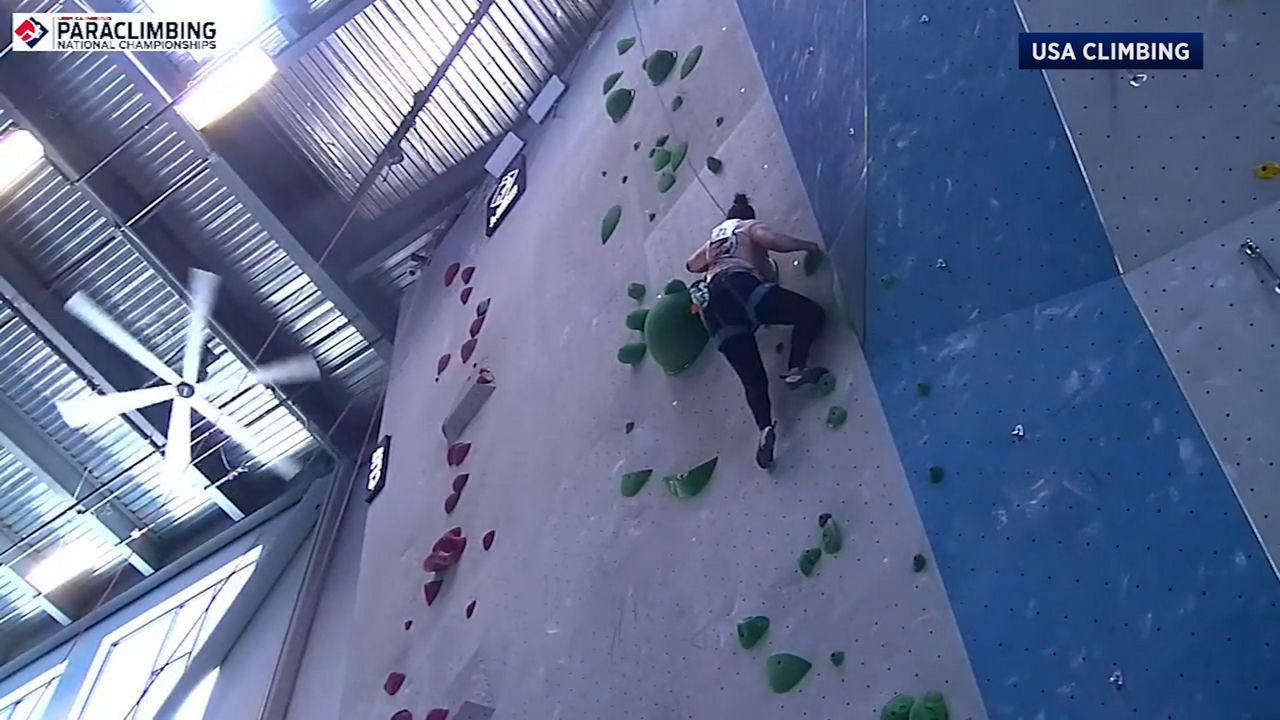
Weeks after coming home, Winstel already has high hopes for the future — not just for her own climbing career, but for others who may never have considered the sport before.
“The warmth that I felt and belonging I think that we both felt in this community is something that we can bring to Cincinnati and that I want to bring to Cincinnati,” she said.
Winstel wants to recruit other aspiring climbers with disabilities to try out the sport and fall in love the same way she did.
Her hope is when the next Paraclimbing National Championships come around in April of 2022, Winstel can bring along a larger crowd of not just cheerleaders but potential competition.



